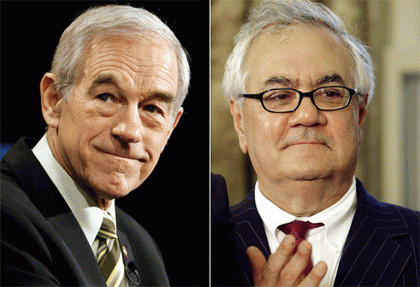Thanks to the recession and debt crisis, progressives seeking to end the failed War on Drugs have some curious bedfellows, including the ultra-conservative Cato Institute, grassroots Tea Party groups, and even mainstream Republicans. Drug Policy Alliance founder and executive director Ethan Nadelmann draws interesting parallels between the decision to end alcohol Prohibition during the Great Depression in the 1930s and recent calls to end the prohibition on marijuana -- and possibly other drugs (http://reason.com/blog/2011/04/15/reasontv-drug-policy-alliances)
Like Prohibition during the 1930s, the War on Drugs is an immense burden on cities and states forced to lay off teachers and cops due to budget deficits. On June 23, Representatives Ron Paul and Barney Frank have made the first attempt to tackle this fiscal disaster on a national level with the Ending Federal Marijuana Prohibition Act of 2011. The goal of HR2306 isn't to legalize marijuana, but to remove it from the register of federally controlled substances. It would allow states to decide how to regulate it. Obama, predictably, opposes the bill, insisting the War on Drugs is working.
Six weeks ago analysts predicted HR 2306 had no chance of getting out of committee. However the recent debt downgrade and market crash means there's a whole new ball game in Washington. Former sacred cows, such as defense spending, are no longer sacred with the Dow below 11,000. Lawmakers who oppose legislation that could save taxpayers $41 billion dollars annually (according to a 2010 Cato Institute Study) will have a hard time answering to voters in 2012.
Pouring Money Down a Rat Hole
Drug policy experts across the board recognize that using the criminal justice system to "punish" drug addicts -- as when Prohibition was used to punish alcoholics -- is like pouring money down a rat hole. Studies show that criminalizing addictive drugs significantly worsens the drug problem, in part by creating a highly lucrative black market. The financial incentive for drug dealing and money laundering is so massive that criminal penalties are no deterrent.
It's not just corner dealers we're talking about. Judging from past Department of Justice indictments for drug money laundering, nearly all major financial institutions in the US and some in Europe have a piece of the action (Merrill Lynch, JP Morgan Chase, Morgan Stanley, Union Bank, Bank of America, American Express, Wachovia, Thomas Cook, Citibank, Chemical Bank, Chase Manhattan, Barclays, Deutsche Bank, among others -- I blog about specific dates and fines at The Scope of Corporate Drug Money Laundering . Moreover the CIA role in trafficking heroin from Vietnam, Southeast Asia and Afghanistan and cocaine from Central America has been well documented by the 1989 Kerry Committee report, academic researchers Alfred McCoy and Peter Dale Scott, and the late journalist Gary Webb.
The Only Solution is Reducing Demand
As retired Missouri Supreme Court Chief Justice and former police commissioner Ray Price pointed out at the 2011 American Bar Association (ABA) meeting in Toronto, the only effective strategy for curbing the drug problem is to lessen demand through prevention and treatment. According to Price, decriminalizing addictive drugs enables us to shift resources from criminal justice to public health, where they will do real good. At the same time it puts criminal dealers out of business, as it did bootleggers in the 1930s, reduces crime, and makes streets safer.
During the ABA Drug Control Panel, Price revealed that the federal government currently spends $26 billion annually across several agencies on the War on Drugs. Of this 34% goes to treatment, 7% to prevention, and 36% to support local law enforcement. Cities and states spend around $30 billion annually on the drug war, with only $9.5 billion of this coming from the federal government.
The Cato Institute and Drug Reform
The extremely conservative Cato Institute is clearly in the forefront of the campaign to end the war on drugs. Their position is that the US should legalize -- not just decriminalize -- all addictive drugs. They justify their viewpoint in two comprehensive, well-researched papers: the 2010 Drug Prohibition White Paper by Miron and Waldcock http://www.cato.org/pubs/wtpapers/DrugProhibitionWP.pdf and the 2009 Drug Decriminalization in Portugal by attorney and Salon columnist Glenn Greenwald (hold on, isn't Greenwald a progressive?) http://www.cato.org/pubs/wtpapers/greenwald_whitepaper.pdf.
An $88 Billion Windfall for Taxpayers
In addition to citing numerous studies showing that criminalization of drug abuse worsens the drug problem, the White Paper calculates that the US could save $41.3 billion dollars from legalizing addictive drugs, as well as collecting an additional $46.7 billion in revenue from regulating and taxing drugs of addiction (like alcohol and tobacco). The difference between legalization and decriminalization is that drug smugglers and suppliers are still prosecuted under decriminalization. This, according to Cato, makes full legalization more beneficial to taxpayers - permitting the legal production and distribution of drugs allows them to be taxed.
(Note: You can view every article as one long page if you sign up as an Advocate Member, or higher).






